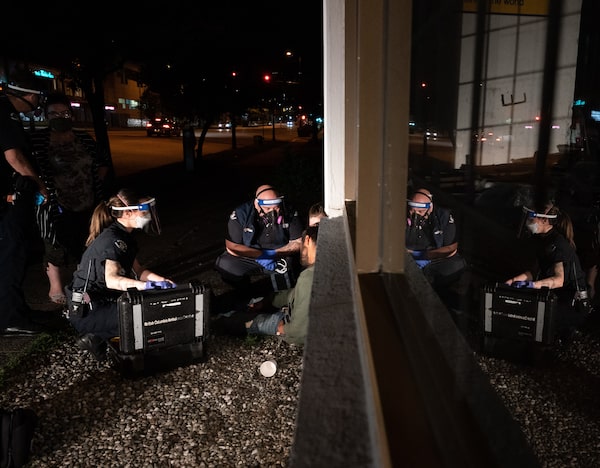
Paramedics from B.C. Ambulance respond to a drug overdose in downtown Vancouver, on June 23, 2021. British Columbia's coroner says over 9,400 people in the province have died of an overdose since the government declared a public health emergency six years ago.JONATHAN HAYWARD/The Canadian Press
British Columbia’s chief coroner says 9,400 people in the province have died of an overdose from toxic illicit drugs since the government declared a public-health emergency six years ago.
Lisa Lapointe said urgent action is needed to decriminalize small amounts of drugs for personal use and to provide more people with a safer supply of substances that would replace the profit-driven illicit market.
Ms. Lapointe said she understands that the concept of a safer drug supply is difficult for some people to understand, given decades of a punitive, enforcement-based approach to substance use, but more people will die without a regulated source of drugs in every part of the province.
An average of six people die every day in B.C., with most of the fatalities occurring in Vancouver, Surrey and Victoria, she said.
The coroner also said preliminary data show at least 174 people died in February from overdoses.
“The deaths of another 174 B.C. residents, so many of them young and middle-aged men with years of life ahead of them, is yet another reminder that urgent action is needed on a provincewide scale,” Ms. Lapointe said in a statement.
British Columbia was the first province to introduce a permanent prescribed safer supply last July, when opioid replacements such as injectable hydromorphone and fentanyl patches were part of a program that was to be rolled out over three years.
A temporary supply was created at the beginning of the pandemic as overdose deaths started climbing and nurse practitioners and doctors were permitted to prescribe medication alternatives to street substances including opioids, stimulants and benzodiazepines.
Mental Health and Addictions Minister Sheila Malcolmson said Tuesday that the overdose crisis “continues to deepen, despite everything we’re throwing at it.”
It’s been particularly challenging to recruit and retain health care professionals to prescribe substitute medications in the region covered by the Northern Health authority, Ms. Malcolmson said.
The Mental Health and Addictions Ministry said that from March, 2020, to December, 2021,, a safer supply has been accessed by more than 12,000 people, with 7,000 of them getting a prescription opioid.
Provincial Health Officer Bonnie Henry said last summer that an estimated 60,000 British Columbians had a substance use disorder.
Ms. Malcolmson said she has also been working with her federal counterpart to try and advance the province’s application on decriminalization so people who possess small amounts of drugs for personal use would not be charged.
She said decriminalization would be “another way to more clearly and firmly assert that substance use at a personal level is a health care matter, not a matter for the criminal justice system.”
British Columbia’s former provincial health officer, Dr. Perry Kendall, declared a public-health emergency on April 14, 2016, as overdose deaths were rising because of the powerful opioid fentanyl in illicit street drugs.
The advocacy group Moms Stop the Harm has also been calling for safer alternatives, arguing the province is too slow to act on a death review panel’s report released by Ms. Lapointe as a record number of people die of overdoses.
A coroner’s report earlier this year said 2,224 people in B.C. died of suspected overdoses in 2021, the most ever recorded in a year. That’s up 26 per cent over 2020.
We have a weekly Western Canada newsletter written by our B.C. and Alberta bureau chiefs, providing a comprehensive package of the news you need to know about the region and its place in the issues facing Canada. Sign up today.